This blog post was written by Kautuk Chaddha (he/him), Project Change Manager at King’s, member of the King’s Climate Action Network and Sustainability Champions group.
The Complexity of Climate Change: Navigating a Global Puzzle
Climate change, a topic as vast as the world itself, can often feel like trying to solve a mind-bending puzzle. It is a conundrum that combines the intricate threads of mathematics, physics, chemistry, economics, social science, geography, earth science, data analysis, and countless other disciplines, and can often feel overwhelming. It can also sometimes feel distant and complex, shrouded in scientific jargon and expert opinions. But here’s the truth: understanding climate change is not reserved for the select few or confined to scientific circles. It’s a global challenge that demands our collective attention and action. In today’s world, where the impacts of climate change are increasingly evident, it has become imperative for everyone to take the initiative to understand this pressing global issue. Why? Because climate change affects us all, regardless of our background or beliefs. It poses risks to our environment, economy, health, and overall well-being. By gaining a deeper understanding of climate change, we equip ourselves with the knowledge and tools needed to make informed decisions and take meaningful action. It allows us to engage in informed conversations, advocate for sustainable solutions, and contribute to a more resilient future. Moreover, understanding climate change fosters a sense of interconnectedness, recognising that our choices and actions have far-reaching consequences, not only for ourselves but for future generations. By collectively embracing the responsibility to comprehend climate change, we empower ourselves to be part of the solution, driving positive change and creating a world that is safer, more sustainable, and prosperous for all.
Below are six of the most common reasons why people fail to understand the risks posed by climate change:
The risks are often framed in technical terms:
The communication surrounding climate change risks often involves technical language and complex terminology. This can present a challenge for individuals to fully grasp and comprehend the risks involved. Scientific reports and discussions by organisations like the Intergovernmental Panel on Climate Change (IPCC) may use specialised jargon that can be difficult for non-experts to understand. As a result, it becomes important to bridge this gap and translate technical concepts into accessible language, enabling a wider audience to engage with and comprehend the risks associated with climate change. By using clear and concise communication strategies, we can ensure that climate change risks are conveyed in a way that resonates with people from diverse backgrounds and facilitates their understanding and participation in addressing this pressing issue. When communicating about climate change risks, it’s crucial to use language of everyday and one that resonates with people from diverse backgrounds. Avoiding excessive jargons and instead employing relatable examples, metaphors, and analogies that draw upon everyday experiences. By relating climate change risks to familiar situations, we can make the topic more accessible and encourage broader participation in addressing this critical issue. Transforming technical concepts into visual representations can also be a game-changer. Infographics, charts, and illustrations can convey complex information in a simple and engaging manner.
The risks are often distant in time and space (and sometimes invisible to the naked eye):
Climate change risks often play hide-and-seek, testing our ability to connect the dots across time and space, while remaining invisible to the naked eye. Picture this: the full impact of climate change may not be immediately obvious, as it unfolds gradually over years and affects diverse corners of the world. This means that it can be challenging for us to see how our own lives are intertwined with the far-reaching consequences of climate change. For instance, consider the gradual loss of coral reefs due to ocean acidification — an almost invisible process to most, but one that threatens entire marine ecosystems and the livelihoods of coastal communities. Connecting the dots between our personal experiences and the broader consequences of climate change can be a challenge. We might not see the direct link between a heatwave in our hometown and the rising global temperatures, or how deforestation on the other side of the world affects our local ecosystem. But make no mistake, the web of climate change weaves through our lives, leaving no one untouched. Think of changes in rainfall patterns, disruptions to ecosystems, or subtle shifts in temperature that occur over extended periods, often slipping under our radar. By unravelling the puzzle of these elusive risks and bringing them into focus, we can empower everyone to grasp the urgency and take meaningful action in the face of this global challenge.
People hold different values:
When it comes to climate change, each person’s unique set of values can shape how they perceive and respond to the issue. Our values reflect what we hold dear in life, whether it’s our family, friends, community, nature, or even economic prosperity. Let’s take a moment to explore how these values can influence our understanding of climate change. Imagine someone who deeply values their family and community. For them, the impact of climate change on their loved ones and local community becomes a significant concern. They may see climate change as a threat to the well-being and future of their family, prompting them to take action. Now consider another individual who places great importance on nature and the environment. They might be deeply moved by the irreversible loss of wildlife habitats or the destruction of pristine landscapes due to climate change. For them, the urgency to address climate change stems from a moral obligation to protect the natural world we rely on. On the other hand, some people may prioritise economic growth and innovation. They might be concerned about the potential costs of addressing climate change or worry that stringent regulations could stifle progress. They might view the issue through the lens of finding economically viable solutions and technological advancements. It’s crucial to recognise that these values can differ across cultures and countries. In the Global South, where communities are tightly connected and rely on one another, the focus is often on the well-being of the collective and building resilience within local communities. Picture close-knit neighbourhoods supporting each other through thick and thin. On the flip side, in the Global North, there’s a stronger emphasis on individual freedoms and pursuing economic growth. Imagine a society where personal choices and economic progress are highly valued. These contrasting perspectives stem from the unique cultural and societal values of each region, shaping how they approach the challenge of climate change. Understanding these variations helps us appreciate the diverse perspectives on climate change and enables us to find common ground for meaningful discussions. By acknowledging and respecting these different values, we can engage in inclusive conversations about climate change that resonate with people from all walks of life. It’s about finding shared aspirations and connecting climate action to what matters most to individuals, whether it’s safeguarding their families, preserving nature’s wonders, or fostering economic prosperity. When we understand and appreciate the values that underpin our diverse perspectives, we can bridge gaps, inspire action, and collectively address the challenges of climate change.
The issue is politicised:
Climate change has unfortunately become a highly politicised issue, with politicians sometimes putting their own interests ahead of the urgent need for action. It’s disheartening to witness how some politicians treat climate change as a mere game, using it as a tool to score political points or advance their personal agendas, rather than actively seeking tangible solutions. Their actions, or lack thereof, can leave people feeling frustrated, unheard, and disillusioned. Consider a scenario where politicians deny or downplay the impact of climate change in order to cater to certain interest groups or secure short-term gains. Such actions not only undermine the urgent need for climate action but also perpetuate the division and confusion surrounding the issue. This politicisation hampers progress and obstructs the collective effort required to combat climate change effectively. However, here’s the essential truth: the effects of climate change do not discriminate based on political ideologies or party affiliations. They transcend boundaries and affect all of us, regardless of our beliefs. Think about the increasingly frequent and severe extreme weather events we witness, such as devastating floods, prolonged droughts, or scorching heatwaves. These events disrupt communities, endanger lives, and strain infrastructure, irrespective of political stances. To overcome the politicisation of climate change, it is crucial for us to hold politicians accountable and demand that they prioritise the well-being of both people and the planet over short-term gains or political games. We have the power to make our voices heard and drive meaningful change. By supporting politicians who genuinely prioritise climate action and sustainability, we can ensure our concerns are represented in decision-making processes. Additionally, joining grassroots movements, engaging in peaceful protests, and advocating for stronger policies can amplify our collective voice and inspire politicians to take decisive action. Climate change is a complex challenge that requires collaborative efforts and innovative solutions. We need our elected leaders to focus on finding practical, science-backed strategies that address the immediate and long-term impacts of climate change. By doing so, we can create a future where the health of our planet and the well-being of all people, irrespective of political affiliations, are prioritised.
People are not always motivated to act:
When it comes to addressing climate change, one of the significant challenges we face is that people are not always motivated to take action. The urgency and complexity of the issue can sometimes feel overwhelming, leading to a sense of helplessness or complacency. People may be preoccupied with their daily lives, juggling various responsibilities and priorities, making it difficult for climate change to take centre stage. Moreover, the consequences of climate change can often seem distant or abstract, making it challenging for individuals to connect their own actions to the larger global impact. Consider a situation where individuals are aware of climate change but struggle to translate that awareness into meaningful action. They might acknowledge the need for sustainable practices but find it challenging to break old habits or make significant lifestyle changes. It’s crucial to recognise that motivations vary from person to person and are influenced by a range of factors such as personal values, beliefs, and life circumstances. To address this motivational gap, we need to inspire and empower individuals to take action. One approach is to emphasise the personal benefits and positive impacts of sustainable choices. Highlighting how adopting renewable energy sources can reduce energy bills or how cycling to work can improve personal health not only creates individual incentives but also contributes to the broader climate change mitigation efforts. Additionally, fostering a sense of community and collective responsibility can help motivate individuals. Encouraging people to participate in local environmental initiatives, join community gardens, or engage in climate-focused events can create a supportive network and foster a sense of purpose. Education and awareness also play a crucial role in motivating action. By providing accessible and reliable information about the impacts of climate change, the benefits of sustainable practices, and the opportunities for positive change, we can inspire individuals to make informed choices. Sharing success stories of individuals and communities who have taken action can also serve as powerful examples and inspire others to follow suit. Ultimately, overcoming the motivation barrier requires a multi-faceted approach that addresses the unique concerns and aspirations of individuals. By recognising the diverse motivations and tailoring our messaging and strategies accordingly, we can create a supportive environment that encourages and empowers everyone to take meaningful action in the fight against climate change. Together, we can unleash the collective potential to create a sustainable and resilient future for ourselves and future generations.
The solutions are often complex and expensive:
When it comes to tackling climate change, it’s crucial to acknowledge that the solutions are often complex and require substantial investments. Transitioning to a low-carbon economy and implementing sustainable practices involves extensive planning, technological advancements, and significant financial resources. This complexity can make it seem daunting and unattainable for individuals and communities to contribute meaningfully to the solutions. For instance, shifting to renewable energy sources requires substantial infrastructure development, research and development, and policy support. Implementing energy-efficient technologies and practices in industries and households necessitates changes in behaviour and investments in new equipment and systems. Additionally, addressing deforestation, promoting sustainable agriculture, and transitioning to circular economy models all require comprehensive approaches that involve multiple stakeholders and require long-term commitment. However, despite the challenges, it’s important to recognise that there are pathways towards a sustainable future. The complexity and cost of solutions should not discourage us from taking action. Instead, we can approach the task by breaking it down into manageable steps and focusing on areas where we can make a difference. One key aspect is promoting innovation and technological advancements. Investing in research and development can lead to the discovery of new clean technologies, making them more accessible and affordable over time. By supporting and advocating for policies that incentivise clean energy and sustainable practices, we can accelerate the adoption of these solutions. Furthermore, fostering collaboration between governments, businesses, communities, and universities is essential. Universities play a crucial role in conducting research, providing expertise, and educating the next generation of leaders in sustainability. Through interdisciplinary studies and partnerships with other stakeholders, universities contribute to the development and dissemination of knowledge, driving forward sustainable solutions. Importantly, while large-scale actions are necessary, individual choices and actions also matter. Each of us can contribute to the solutions in our own capacity by adopting sustainable lifestyles, reducing waste, conserving energy, and supporting environmentally responsible businesses. Small changes, when multiplied by collective efforts, can have a significant positive impact. By recognising the complexity and cost of solutions, we can approach the task with a combination of ambition, collaboration, innovation, and the expertise of universities. By harnessing the collective will and resources, we can unlock the potential to create a sustainable future for generations to come.
In conclusion, climate change is a pressing global challenge that demands our collective attention and action. It’s not just for scientists or a select few—it affects us all. Understanding climate change empowers us to make informed decisions, engage in meaningful conversations, and advocate for sustainable solutions. By bridging the gap between technical language and accessible communication, we ensure that climate change risks are understood by people from diverse backgrounds. Connecting personal experiences to the broader consequences fosters a sense of interconnectedness, encouraging wider participation in finding solutions. Recognising different values and perspectives allows for inclusive discussions that resonate worldwide. Overcoming the politicisation of climate change requires holding politicians accountable and prioritising the well-being of both people and the planet. Motivating action involves highlighting the personal benefits of sustainable choices, fostering community and collective responsibility, and promoting education and awareness. Though solutions may be complex and costly, they are within reach. By supporting innovation, collaboration, and individual actions, we can pave the way towards a sustainable and resilient future. Together, we can make a difference.
“Never doubt that a small group of thoughtful, committed citizens can change the world; indeed, it’s the only thing that ever has.”
Margaret Mead


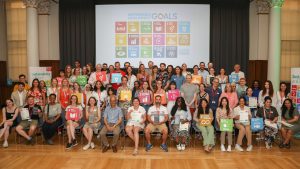
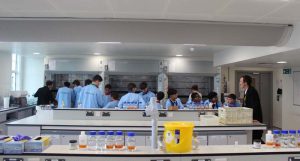
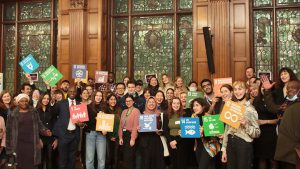
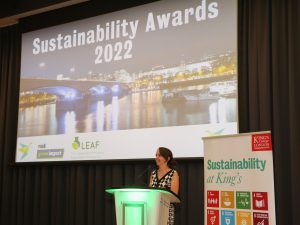
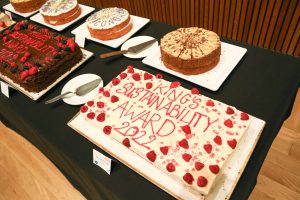
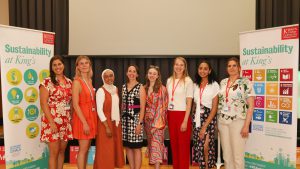

 Marco Hacon is currently studying for a Master’s degree in Environment, Politics and Development here at King’s. Before this, he worked in a few start-ups and scale-up companies with social purposes, where he gained a basic understanding of sustainability. He is a strong believer in a just and equitable clean energy transition. He is excited to write about this as well as more King’s-related energy topics for the team’s blog. He also wants to help develop toolbox talks for King’s staff and teams that centre on how to use energy sustainably.
Marco Hacon is currently studying for a Master’s degree in Environment, Politics and Development here at King’s. Before this, he worked in a few start-ups and scale-up companies with social purposes, where he gained a basic understanding of sustainability. He is a strong believer in a just and equitable clean energy transition. He is excited to write about this as well as more King’s-related energy topics for the team’s blog. He also wants to help develop toolbox talks for King’s staff and teams that centre on how to use energy sustainably.